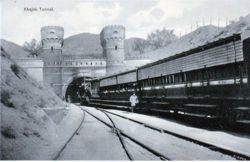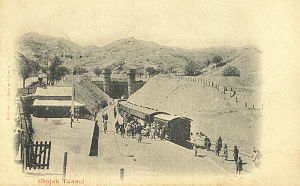Khojak Tunnel: Difference between revisions
fix link +widget |
Full revision with new headings |
||
| (One intermediate revision by the same user not shown) | |||
| Line 12: | Line 12: | ||
[[Image:Khojak tunnel.jpg|thumb|Khojak Tunnel|300px]] | [[Image:Khojak tunnel.jpg|thumb|Khojak Tunnel|300px]] | ||
==Background== | |||
The tunnel was constructed by the ‘[[Sind-Pishin State Railway]]’(SPSR). | |||
<br>The ‘[[Quetta Link Railway]]’ was ordered by the British Government in 1876 as a strategic railway. The section from Ruk Junction to Sibi opened 1880, constructed by the SPSR which merged into NWR 1886; extended from Sibi via Quetta , Mushkaf and Bostan 1887. The [[Mushkaf-Bolan Railway| 'Mushkaf-Bolan Section' through the Bolan Pass]] was a major challenge as described in the page ‘[[Bolan Pass Railway Construction]]’, the track was twice washed away and finally opened after reconstruction in 1887. The line reached Killa Abdulla, 1888;. The further section reached Chaman 1892, this required the temporary use of the ‘[[Khojak Rope Inclines]]’ from 1888 until the opening of the ‘[[Khojak Tunnel]]’ in 1892, these again were major challenges described on separate pages. | |||
==Khojak Rope Inclines== | |||
[[Khojak Rope Inclines|''- see separate page'']] | |||
<br>Prior to the opening in 1891 of the [[Kojak Tunnel ]]a temporary system of ropeways were constructed over the Kwara Amran range of mountains on the Afghan frontier of India. The object was twofold<ref name=ICERopeway>[https://www.icevirtuallibrary.com/doi/abs/10.1680/imotp.1893.20036 ‘Minutes of the Proceedings of the Institution of Civil Engineers’ Volume 112 Issue 1893, pp. 310-320 ‘The Khojak Rope-Inclines’ by W J Weightman ]; Retrieved on 18 Nov 2020</ref>:- | |||
* “To facilitate the conveyance of machinery and stores for the western end of the tunnel and to expedite the extension of the railway beyond it” | |||
* “As a military precaution to provide for the conveyance of troops and military stores to the front in case of need” | |||
This temporary system was in use from 1888 for a period of three years | |||
==Tunnel Construction== | |||
The work on Khojak Tunnel began on April 14, 1888 and the first steam engine rolled through the completed tunnel on September 5, 1891. The details of the construction with photographs are given in detail in the ‘Indian Railways Fan Club’ Article <ref>[https://www.irfca.org/articles/khojak-tunnel.html IRFCA Article ‘Khojak Tunnel’ by Owais Mughal, Dec 2006]; Retrieved 24 Nov 2020</ref>. | |||
==Length== | ==Length== | ||
* 3.912 kms (2.415 miles). At inauguration it was the fourth longest tunnel in the world and until 2009, the longest in Pakistan. | * 3.912 kms (2.415 miles). At inauguration it was the fourth longest tunnel in the world and until 2009, the longest in Pakistan <ref>[https://en.wikipedia.org/wiki/Khojak_Tunnel Wikipedia ‘Khojak Tunnel’]; Retrieved 24 Nov 2020</ref>. | ||
==Photographs== | ==Photographs== | ||
| Line 23: | Line 37: | ||
* [http://web.archive.org/web/20130122144454/http://pakistaniat.com/2006/12/18/railways-khojak-tunnel Khojak Tunnel] on All Things Pakistan, now an archived website | * [http://web.archive.org/web/20130122144454/http://pakistaniat.com/2006/12/18/railways-khojak-tunnel Khojak Tunnel] on All Things Pakistan, now an archived website | ||
* [http://www.travel.web.pk/adventureclub/news/news_08.asp Khojak Pass with the longest tunnel in Pakistan] | * [http://www.travel.web.pk/adventureclub/news/news_08.asp Khojak Pass with the longest tunnel in Pakistan] | ||
== References == | |||
<references /> | |||
{{#widget:Google PlusOne | {{#widget:Google PlusOne | ||
| Line 29: | Line 46: | ||
}} | }} | ||
[[Category: Railways]] | |||
[[Category: | [[Category: Railway Constructions]] | ||
[[Category: Railway | |||
Latest revision as of 16:04, 24 November 2020
| Khojak Tunnel | |
|---|---|

| |
| Presidency: | |
| Coordinates: | |
| Altitude: | |
| Present Day Details | |
| Place Name: | Khojak Tunnel |
| State/Province: | Baluchistan |
| Country: | Pakistan |
| Transport links | |
Khojak Tunnel was a railway tunnel in the Khojak Pass, which was situated on the railway line between Quetta and Chaman in Quetta-Pishin District, Baluchistan. Lying 1,945 metres above sea level, it was completed in 1891.

Background
The tunnel was constructed by the ‘Sind-Pishin State Railway’(SPSR).
The ‘Quetta Link Railway’ was ordered by the British Government in 1876 as a strategic railway. The section from Ruk Junction to Sibi opened 1880, constructed by the SPSR which merged into NWR 1886; extended from Sibi via Quetta , Mushkaf and Bostan 1887. The 'Mushkaf-Bolan Section' through the Bolan Pass was a major challenge as described in the page ‘Bolan Pass Railway Construction’, the track was twice washed away and finally opened after reconstruction in 1887. The line reached Killa Abdulla, 1888;. The further section reached Chaman 1892, this required the temporary use of the ‘Khojak Rope Inclines’ from 1888 until the opening of the ‘Khojak Tunnel’ in 1892, these again were major challenges described on separate pages.
Khojak Rope Inclines
- see separate page
Prior to the opening in 1891 of the Kojak Tunnel a temporary system of ropeways were constructed over the Kwara Amran range of mountains on the Afghan frontier of India. The object was twofold[1]:-
- “To facilitate the conveyance of machinery and stores for the western end of the tunnel and to expedite the extension of the railway beyond it”
- “As a military precaution to provide for the conveyance of troops and military stores to the front in case of need”
This temporary system was in use from 1888 for a period of three years
Tunnel Construction
The work on Khojak Tunnel began on April 14, 1888 and the first steam engine rolled through the completed tunnel on September 5, 1891. The details of the construction with photographs are given in detail in the ‘Indian Railways Fan Club’ Article [2].
Length
- 3.912 kms (2.415 miles). At inauguration it was the fourth longest tunnel in the world and until 2009, the longest in Pakistan [3].
Photographs
- Around the world in the 1890s: Photographs from the World Transportation Commission 1894 - 1896, Library of Congress.Website (type Khojak Tunnel to get results)
External Links
- Wikipedia
- Khojak Tunnel on All Things Pakistan, now an archived website
- Khojak Pass with the longest tunnel in Pakistan
References
- ↑ ‘Minutes of the Proceedings of the Institution of Civil Engineers’ Volume 112 Issue 1893, pp. 310-320 ‘The Khojak Rope-Inclines’ by W J Weightman ; Retrieved on 18 Nov 2020
- ↑ IRFCA Article ‘Khojak Tunnel’ by Owais Mughal, Dec 2006; Retrieved 24 Nov 2020
- ↑ Wikipedia ‘Khojak Tunnel’; Retrieved 24 Nov 2020